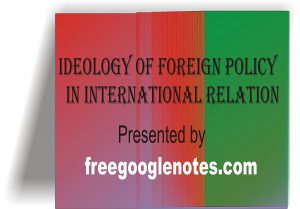Table of Contents
Ideology of Foreign Policy in International Relation
In the below post you will read ba llb 2nd semester notes pdf
for more please follow @blogger_priya
IDEOLOGY OF FOREIGN POLICY
Q. 1. Explain the Principals of India’s foreign policy.
Ans. 1. Non-Alignment: The policy of non-alignment is the most important contribution of India to the international community. Immediately after the hostilities ended in the Second World War, a new and unprecedented tension of developed between the erstwhile the friends and allies. The acute state of tension came to be called the Cold War. The division of the world into two blocs led by the United States and the former Soviet Union respectively caused the Cold War. India made up its mind not to join any of the power blocs. India’s decision to follow an independent foreign policy was dictated essentially by its national interest, and also by its belief in the moral value attached to the ideal of friendship among all, and pursuit of world peace. India had decided to devote. its energies to its economic development. For that, India needed not only friendship with neighbours and big powers, but also economic assistance. from different quarters. India made it clear that it would reserve the right to freely express its opinion on international problems. If it would join any of the power blocs then it would lose this freedom.
India’s geographical situation – its location at the junction of
South-East Asia and Middle of East, and its strategic position in the Indian Ocean, and as a neighbour of Communist China in the North-made it imperative to keep away from military alliances. The policy of non-alignment is in accordance with Indian philosophy and tradition. A former U.S. ambassador to India, Chester Bowels had said of Nehru and his policy of non-alignment. “If Nehru becomes a formal ally of the West in the Cold War, he would be going against the whole grain of Asian anti-colonial sentiment. He would be under constant and effective attack as a ‘stooge of Western imperialism’. By his independence of either block, he is able to draw on all the pride of Indian nationalism and to change convincingly that it is the Asian communists who are the foreign stooge.”
India’s policy of non-alignment is discussed at length in the next chapter. Therefore, it is enough here to briefly mention it as the most important pillar of our foreign policy.
2. Panchsheel and Peaceful Co-existence: Peaceful co-existence of nations of diverse ideologies and interests is an important principle of our foreign policy. Indian philosophy of Vasudhaiva Kutumbkam promotes the feeling of ‘one world. In practice, it means that nations inhabited by people belonging to different religions and having different social systems can co-exist, live together in peace, while each follows its own system. This basic Indian philosophy was formally recognised when in 1954, India and China signed the famous declaration of five principles, detailed below, were formally enunciated in the Sino-Indian agreement of April 29, 1954, regarding trade and intercourse between the Tibetan Region of China and the Republic of India. The five principles mentioned in the Preamble of the agreement were:
(i) mutual respect for each other’s territorial integrity and sovereignty
( ii) mutual non-aggression,
(iii) mutual non-interference in each other’s internal affairs;
(iv) equality and mutual benefit; and
(v) peaceful co-existence.
Speaking in the Parliament, Prime Minister Nehru had said; “I imagine that if these principles were adopted in the relations of various countries with each other, a great deal of the trouble of the present-day World would probably disappear.” Two months later, during Chinese Premier Chou En-lai’s visit to India. Nehru and Chou, in a joint statement, said that if these principles were applied not only by Asian countries in their bilateral relations but also in international relations
The term, Panchsheel soon became so popular that Nehru called it an “international coin.” These principles were incorporated in the Declaration on World Peace and Cooperation, adopted by the Asian-African Conference held at Bandung (Indonesia) in April 1955, as well as in a resolution of principles of co-existence adopted by. Inter-Parliamentary Union at its Helsinki session in August 1955. By the end of 1956, many countries including Afghanistan, Burma, Indonesia, Egypt, Nepal, Poland, USSR, Saudi Arabia and Yugoslavia had endorsed the Panchsheel, In 1959, the U.N. General assembly also resolved to adopt the five principles. The term Panchsheel in found in ancient Buddhist literature, and refers to five principles of good conduct of the individuals. These are truth, non-violence, celibacy, refrain from drinking and vow not to steal.
In 1945, President Soekarno of Indonesia had announced five principles of Indonesian national policy. These five principles called Panjashila were; faith in nationalism, faith in humanity, faith in independence, faith in social justice and faith in God. But, the five principles of Panchsheel declared in 1954 were neither principles of good conduct of individual nor of nationalism. These are principles of behaviour of a sovereign state in their foreign relations. These are normal expectations from civilised nations in their behaviour with each other. To respect the territorial integrity of others and not to commit aggression are vital objectives of friendly international relations. By stating them in India-China declaration (along with other principles) was only to emphasise the value, that we attach to them. But within a few years when China began encroaching upon our territory by building a road in the Aksai Chin area, Panchsheel was threatened. When aggression was committed by China in 1962, it was a clear violation of ‘mutual non-aggression’. The fifth principles; i.e, peaceful co-existence emphasise the importance of peaceful living by all nations irrespective of their ideology. A liberal democracy (India) and a Communist country (China) need not attempt to force their ideologies on the other. “In the context of ‘cold war ..it means that it is both possible and necessary that countries with different political, economic or other systems should exist side by side and work together peacefully”, says Prof. M. S. Rajan,
“It also means that every nation has a right to its political and social order and to develop along its own line.” Peaceful co-existence is not a misfortune to be endured but a fact which enriches the diversity of human society,” opined K.PS. Menon, il was not just: “co-endurance.”
The principles contained in Panchsheel were, according to Nehru, a consequence of democratic outlook. “The person who rejects the idea of co-existence rejects basically the democratic outlook.” Although Nehru has opined that if a country violated the principles of Panchsheel it was “likely to find itself in a much quandary”. None other than China enthusiastic about Panchsheel that, for him, the alternative was likely to be conflict and co-destruction. The most important aspect of Panchsheel is peaceful co-existence. Ideology has often caused tensions conflicts and wars. Thus, Fascism-Nazism played havoc by advocating ultra-nationalism, war, rearmament and opposition to communism. Hatred was spread in the name of ideology, anti-committed Pact concluded, aggressions and annexations took place. The ideology of the Soviet Union supported anti-Fascist Popular Fronts. The idea of peaceful co-existence is morally so correct that it allows all the countries to follow their ideology without interfering in internal affairs of the other. Despite the 1962 border war, India has remained firmly committed to the principles of Panchsheel.

3. Freedom of Department of Peoples: Anti-Imperialism.
Anti-colonialism and anti-imperialism have been a matter of faith with India’s foreign policymakers. Having been a victim of British imperialism for a long time, India decided to oppose all forms of colonialism and imperialism. Therefore, it decided to extend full support to the cause of freedom of dependent peoples of Asia and Africa.
One of the first decisions that Nehru’s Interim Government took was to recall the Indian troops sent by the British to suppress the freedom struggle in the Dutch and French colonies. The Dutch colony of Indonesia had been taken by the Japanese during the Second World War. When after Japanese defeat, the Netherland tried to establish its rule again, India opposed it even in the United Nations and cooperated with Indonesia in its efforts to get independence. India fully supported the freedom struggles in Asian and African countries such as Indo-China, Malaya, Libya, Algeria, Tunisia, Gold Coast (now Ghana, etc: India fully supported the cause of independence of the people of Namibia who were under the prolonged colonial rule of racist South Africa. Promotion of self-determination of all colonial people was, thus, an important
The Western view in the context of the cold war was that international Communism was a bigger threat than colonialism. India did not agree with this view. According to Nehru, the real question in Asia was that of ‘colonialism versus anti-colonialism’. In fact, India felt that if colonialism was not quickly abolished it was likely to encourage communism among the colonial peoples. Nehru had once said, “Colonialism represents the biggest threat to Asia and Africa and leads to communism.” Both colonialism and communism are of European origin and India emphasised that end of colonialism was urgently required.
discrimination, and its symbol South Africa. It is only in early 1994 that apartheid was finally given up and a majority government was duly elected and installed under the leadership in Nelson Mandela. Having achieved the goal of racial equality in South Africa, India re-established full relation with that country.
India has consistently supported the establishment of an egalitarian human society in which discrimination based on colour, race, class etc. does not exist. India firmly believes that racialism is one of the sources of conflict in the world, the, therefore, a threat to international peace and security. India has supported the U.N. efforts leading to the adoption of covenants of human rights and the observance of fundamental freedom all over the world.
5. Foreign Economic Aid and India’s-Independent Policy: India firmly believed that economic development of the country was an urgent necessity. Soon after independence, India devoted its energies to a planned and rapid all-round development. India was painfully aware of the lack of adequate resources and technical know-how. India had already decided on non-alignment basic policy. That implied the adoption of an independent foreign policy. But, if India was to develop it needed funds, machinery and technical know-how. India needed economic assistance as well as loans for numerous projects that it wanted to start in the process of multi-faceted development of the country.
The financial and technological help that we needed could come cither from the United States or the Soviet Union. It was generally believed that the USSR would not help a non-communist country. The business community in India as well our Government realised that the only country that could give substantial help was the United States of America. Still, the Government of India did not want to compromise with the principle of non-alignment, independence and sovereignty of the country. Nehru said in June 1948; “We would rather delay our development by any country.” Despite India’s firm’s decision not to accept any ad with strings, India had come quite close to the United States by 1949. Many sections of Indian industry were putting pressure on the Indian Government to secure foreign capital as the nationalisation of industry was not practicable. The success of Communists in China India realises that there was a danger of communism raising its head in India also unless our economic development was initiated in a big way, naturally with foreign aid. Even in the United States, there was a growing realisation of urgent need of helping India so as to avoid Chines
communist type success in this country. Thus, began the process of economic assistance to India from the United States.
As the process of development was accelerated, India began accepting aid from the World Bank and at other times with a clear tilt towards the former Soviet Union. However, India tried to maintain balance and pursue an independent policy. At, on stage under India Gandhi’s leadership, India chose to go in for large scale nationalisation As socialism was made a goal of the Indian economy (Forty-Second Amendment, 1976), the Western countries began to disbelieve India policy of independent decision-making and non-alignment. As India decided to liberalise her economy in mid-1991, and as the Soviet Union disintegrated at the end of 1991, India’s assertion that it continues to follow an independent policy, critics have been charging of sell-out to the West-dominated World Bank and International Monetary Fund who are guiding India’s economic policy and liberalisation process.
6. Support to the United Nations: India is one of the founder members of the United Nations, and many of its specialised agencies. It has full faith in the international organisation and agencies. India firmly believes in international peace and security. India does not support the nuclear in weapons, wants their elimination and considerable reduction of conventional weapons and armed forces. India believes that these goals can be achieved by strengthening the United Nations. India is an important member of the group of Non-Aligned in the United Nations. she is also a prominent Afro-Asian Member of the world body. India has sponsored and supported several progressive measures in the U.N. and its agencies. India’s Mrs Vijay Lakshmi Pandit was elected President of the General Assembly in,1953. India has been a non-permanent member of the Security Council for a number of terms. Her contribution to the cause of world peace has been universally recognised. India has enthusiastically responded to the call of the United Nations to serve in collective security and peacekeeping efforts. India sent a medical unit in the Korean War and participated actively in the repatriation of prisoners of war after the Korean crisis. India has sent help at the call of the United Nations for peacekeeping to Egypt, Congo and Yugoslavia.
The Indian army generals have been given four responsibilities for peacekeeping activities. In 1953 India held the Chairmanship of the Neutral Nations Repatriation Commission (NNRC) for Korea, charged with the custody and repatriation of the prisoners of war. In July 1954 India chaired the International Commission for Supervision and Control
in Indochina. During 1960-63 peacekeeping, operations were organised in Congo by the Indian Independent Brigade. In 1992 the responsibility of heading the United Nations Protection Force in Yugoslavia was also entrusted to. an Indian General.
India has continuously supported the efforts for universalisation for the United Nations. When applications of a number of countries of membership of the U.N. were rejected in the mid-1950s, as either the USSR or nationalist China used the veto to bar their entry, India’s V. K. Krishna Menon used his diplomatic skill and with the support of many other like-minded countries persuaded the big Powers to allow admission of 16 new Members in 1955. India was one of the first countries to recognise Communist China after the revolution in 1949. India consistently supported the application of the People’s Republic of China for representation in the U.N. and expulsion of Nationalist China. India had taken a value-based stand on the question of Chinese representation. Even alter Chinese. attack on India, and the border war, in 1962 our stand did not change. Despite being a victim of Chinese aggression, India stood by its commitment that the U.N. could not really become a universal organisation so long as one-fifth of humanity remained out of it.
There are several other areas in which India has played a significant role in the United Nations. For example, India has played a consistently positive and energetic role in arms control and disarmament. In the field of human rights, the issues which attracted India’s attention quite Carly were racial discrimination and colonialism (as already discussed). India’s contribution has also been significant in the areas of health, food, children’s welfare and improvement of the conditions of working people. As Professor Satish Kumar says: .notwithstanding occasional lapses, India’s contribution the promotion of the objectives of the United Nations cannot be regarded as inferior to, or less valuable than, that of any other member of the United Nations, including any permanent Member of the Security Council.” In this background, India’s claim for a permanent seat in the U.N. Security Council is no less justified than that of countries like ‘Germany and Japan.
7. Peaceful Settlement of International Disputes: Disputes among nations are unavoidable. There can be only two methods of settling international disputes: war, or peaceful settlement. War has been the most commonly used method of deciding disputes from the pre-historic days till now. War was considered the legitimate means of deciding disputes, It resulted in the victory of one nation over the other. By the
end of the First World War, the destructiveness of this method had reached borrowing heights. Since then it has been increasingly realised by an international community that peaceful settlement of disputes should be The goal of not an only international organisation, but also of all states. This includes besides direct negotiations, means such as mediation, conciliation, arbitration and judicial decisions. The last-mentioned method is used only in case of legal disputes, whereas political disputes can be sought to be settled through other means.
India’s foreign policy goal is pacific (peaceful settlement of disputes here the emphasis is on “peaceful” rather than “settlement”. Professor M. S. Rajan says that “This is, of course, a corollary to the major and primary objective of promoting international peace and Security…” Thus, if India’s goal is international peace, pacific settlement of disputes is the natural means.
The founding fathers of the Constitution of India were keen to remind all future government that India/as a nation desires peaceful settlement of international disputes. That is why Article 51 of the Constitution (in Part, IV, Directive Principles of State Policy) lays down that the state shall endeavour to seek a peaceful settlement of international disputes. India does not believe in ‘negotiation through strength’ because that is illogical. As Nehru himself pointed out, “.. the world had arrived at a stage when even if one party was relative. weaker, the effect on both was the same: they had reached a saturation point in regard to weapons of mass destruction. Thus, India has made it a matter of faith to help seek a peaceful settlement of disputes. M. S. Rajan observes: “Even at the risk of being persistently taken as ‘poking one’s nose in other people’s affairs’. India reserved in her self-appointed role of conciliation in the settlement of international disputes and conflicts.” Although India herself had to face wars imposed upon her, its faith in pacific means is not shaken.
Normally, in countries like Britain, basic principles of foreign policy do not radically change whenever there is a change of government. We have adopted this tradition and even when Prime Minister and Foreign Minister have changed, India’s basic commitments have remained unaltered, Officials of Foreign Services make valuable input in the foreign policy-making, 50 that even when a leader like Atal Bihari Vajpayee took charge of office as Foreign Minister (1977-79), despite his strong views on certain issues, no significant changes were made in the objectives and principles of India’s foreign policy.









